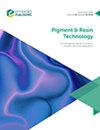Comparison of life cycle assessment for laminating and glazing processes based on simapro
IF 1.5
4区 材料科学
Q3 CHEMISTRY, APPLIED
引用次数: 4
Abstract
Purpose Both glazing and laminating play a certain role in finishing and protecting the surface of printed matter. This study makes a comparative analysis of the two through life cycle assessment (LCA) and theoretically explores the difference between them. Design/methodology/approach In this study, the life cycle of laminating and glazing processes was calculated through using Simapro software, and the results were compared and analyzed. Findings Twelve environmental categories were used to quantitatively analyze the environmental impact of the product. The results showed that the results of the 12 environmental categories involved in the analysis of glazing was less than that of laminating, indicating that the impact of the glazing on the environment was less than that of laminating on the environment. Research limitations/implications In order to simplify the study, we only calculated and analyzed the laminating and glazing. Practical implications Green packaging is the future, 3R1D, reduce, reuse, recycle and degradable. According to the calculation results, corresponding suggestions can be put forward from production, processing, use, waste and other aspects, and make corresponding contributions to the development of green packaging. Originality/value The contribution and impact of each stage to the product life cycle can be studied. In addition, different waste disposal methods have different impacts on the environment, and the higher the recovery ratio, the better the environmental benefits of the product. Recycling should then be promoted as proportionately as possible in practice in order to reduce the environmental impact .基于simapro的层压和上釉工艺生命周期评估的比较
目的上光和层压对印刷品表面的整理和保护都有一定的作用。本研究通过生命周期评价(LCA)对两者进行了比较分析,并从理论上探讨了两者之间的差异。设计/方法/方法在本研究中,使用Simapro软件计算了层压和上釉工艺的生命周期,并对结果进行了比较和分析。结果采用12个环境类别对该产品的环境影响进行了定量分析。结果显示,嵌装玻璃分析涉及的12个环境类别的结果均小于层压,表明嵌装玻璃对环境的影响小于层压环境。研究局限性/含义为了简化研究,我们只计算和分析了层压和上釉。实际意义绿色包装是未来,3R1D,可减少、重复使用、可回收和可降解。根据计算结果,可以从生产、加工、使用、废弃物等方面提出相应的建议,为绿色包装的发展做出相应的贡献。原创性/价值可以研究每个阶段对产品生命周期的贡献和影响。此外,不同的废物处理方法对环境的影响也不同,回收率越高,产品的环境效益越好。然后,应在实践中尽可能按比例促进回收利用,以减少对环境的影响。
本文章由计算机程序翻译,如有差异,请以英文原文为准。
求助全文
约1分钟内获得全文
求助全文
来源期刊

Pigment & Resin Technology
工程技术-材料科学:膜
CiteScore
2.80
自引率
21.40%
发文量
91
审稿时长
>12 weeks
期刊介绍:
The journal looks at developments in: ■Adhesives and sealants ■Curing and coatings ■Wood coatings and preservatives ■Environmentally compliant coating systems and pigments ■Inks for food packaging ■Manufacturing machinery - reactors, mills mixing and dispersing equipment, pumps ■Packaging, labeling and storage ■Plus topical features and news on materials, coatings, industry people, conferences, books and so on ■Raw materials such as pigments, solvents, resins and chemicals ■Testing equipment and procedures
 求助内容:
求助内容: 应助结果提醒方式:
应助结果提醒方式:


